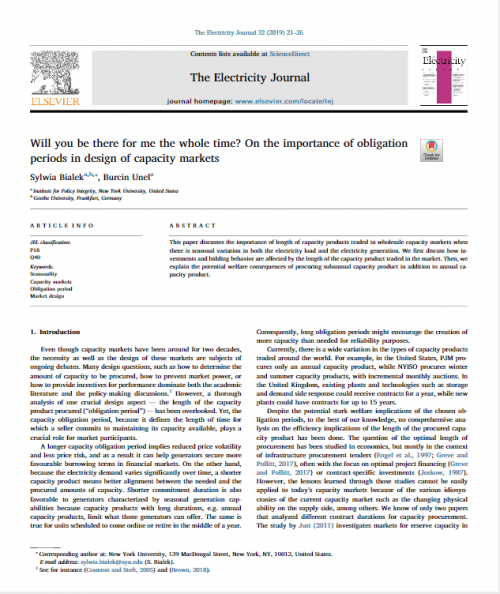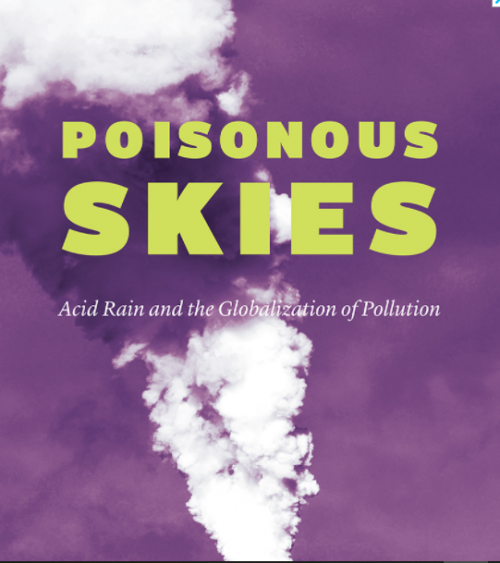-
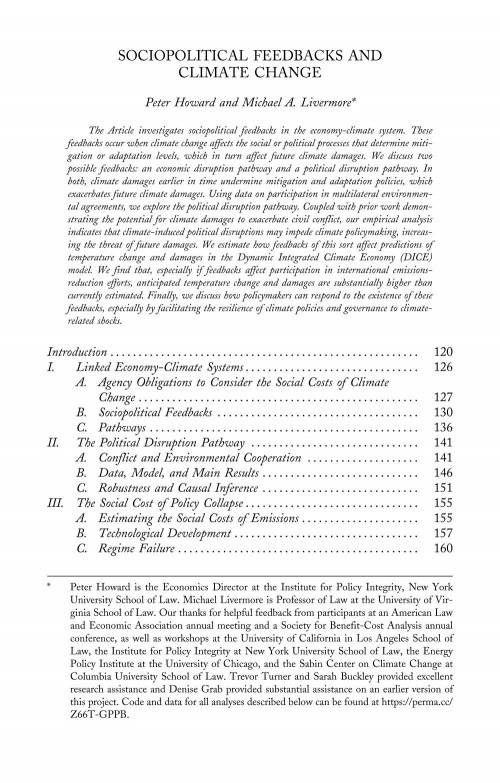
Sociopolitical Feedbacks and Climate Change
This article, published in the Harvard Environmental Law Review, investigates sociopolitical feedbacks in the economy-climate system. These feedbacks occur when climate change affects the social or political processes that determine mitigation or adaptation levels, which in turn affect future climate damages. Two possible feedbacks are an economic disruption pathway and a political disruption pathway. In both, climate damages earlier in time undermine mitigation and adaptation policies, which exacerbates future climate damages. Using data on participation in multilateral environmental agreements, the article explores the political disruption pathway.
-
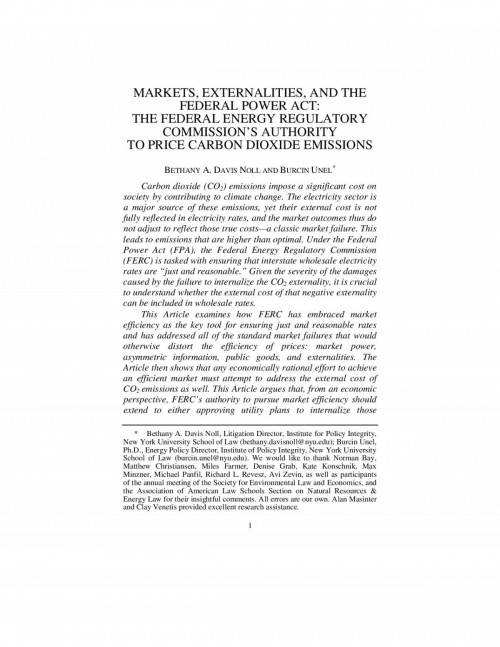
Markets, Externalities, and the Federal Power Act
The Federal Energy Regulatory Commission’s Authority to Price Carbon Dioxide Emissions
This article, published in the New York University Environmental Law Journal, shows how the Federal Energy Regulatory Commission (FERC) must attempt to address the external cost of carbon dioxide (CO2) emissions to achieve an efficient electricity market. CO2 emissions impose a significant cost on society by contributing to climate change. The electricity sector is a major source of these emissions, yet their external cost is not fully reflected in electricity rates, and the market outcomes thus do not adjust to reflect those true costs—a classic market failure. This leads to emissions that are higher than optimal.
-
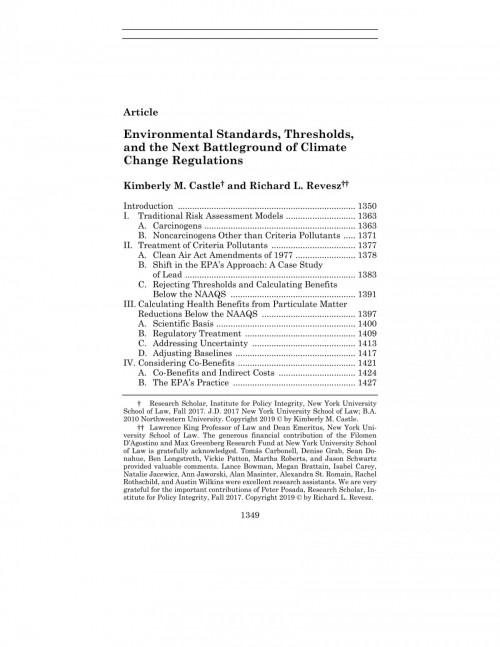
Environmental Standards, Thresholds, and the Next Battleground of Climate Change Regulations
This article, published in the Minnesota Law Review, addresses a central battleground of the debate about the future of greenhouse gas regulations: the valuation of particulate matter reductions that accompany reductions in carbon dioxide emissions. The benefits from particulate matter reductions are substantial for climate change rules, accounting for almost one half of the quantified benefits of the Obama Administration’s Clean Power Plan. These benefits are also significant for regulations of other air pollutants, making this issue one of far-reaching importance for the future of environmental protection.
-
Will You Be There for Me the Whole Time?
On the Importance of Obligation Periods in Design of Capacity Markets
This paper discusses how variations in the availability of various resources (generation seasonality) and the fluctuations in the electricity usage (load seasonality) relate to efficient capacity market design. Even though capacity markets have been around for two decades, the necessity as well as the design of these markets are subjects of ongoing debates. Many design questions, such as how to determine the amount of capacity to be procured, how to prevent market power, or how to provide incentives for performance dominate both the academic literature and the policymaking discussions. Another design aspect that plays a crucial role for market participants is the length of the capacity product procured (“obligation period”), because it defines the length of time for which a seller commits to maintaining its capacity available. However, a thorough analysis of obligation periods has been overlooked by literature and policymaking discussions. Our article works to provide this analysis.
-
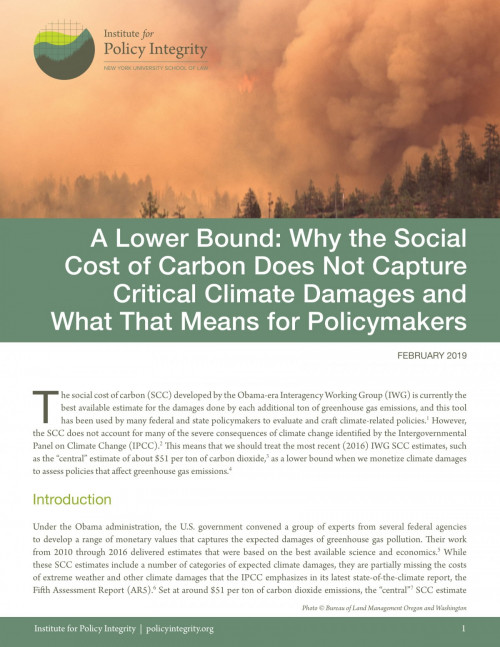
A Lower Bound
Why the Social Cost of Carbon Does Not Capture Critical Climate Damages and What That Means for Policymakers
The Social Cost of Carbon, developed by the Obama-era Interagency Working Group (IWG), is the best available tool for measuring the economic damages from greenhouse gas emissions. It has been used in analysis for over 100 federal regulations that affect greenhouse gas emissions, as well as by a number of states in electricity and climate policy. Still, many significant impacts identified by the Intergovernmental Panel on Climate Change are difficult to quantify and so have been omitted from the IWG SCC estimates. Impacts such as increased fire risk, slower economic growth, and large-scale migration are all unaccounted for, despite their potential to cause large economic losses. Our new issue brief discusses these omissions and other variables that will influence climate outcomes. We encourage policymakers to account for this likely underestimate by viewing the SCC as a lower bound for damages.
-
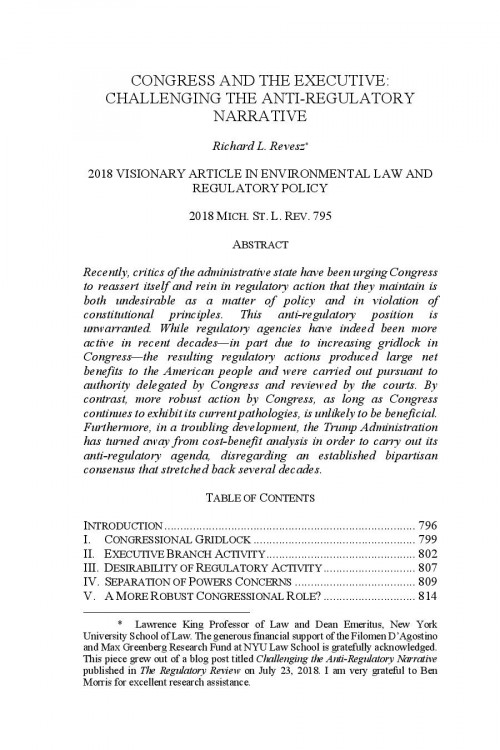
Congress and the Executive
Challenging the Anti-Regulatory Narrative
Critics of the administrative state have been urging Congress to rein in regulatory action, claiming that regulations created by executive agencies are undesirable as a matter of policy and are in violation of constitutional principles. In a troubling development, the Trump Administration has also turned away from cost-benefit analysis in order to carry out its anti-regulatory agenda, disregarding an established bipartisan consensus that stretched back several decades. This article, published in the Michigan State Law Review, argues that this anti-regulatory position is unwarranted. These executive regulatory actions produced large net benefits to the American people, were carried out pursuant to authority delegated by Congress, and were reviewed by the courts. By contrast, more robust action by Congress, as long as Congress continues to exhibit its current gridlock on important policy issues like climate change, is unlikely to be beneficial.
-
Poisonous Skies
Acid Rain and the Globalization of Pollution
Grounded in archival research spanning eight countries and five languages, as well as interviews with leading scientists from both government and industry, Poisonous Skies is the first book to examine the history of acid rain in an international context. By delving deep into our environmental past, Rothschild hopes to inform its future, showing us how much is at stake for the natural world as well as what we risk—and have already risked—by not acting.
-
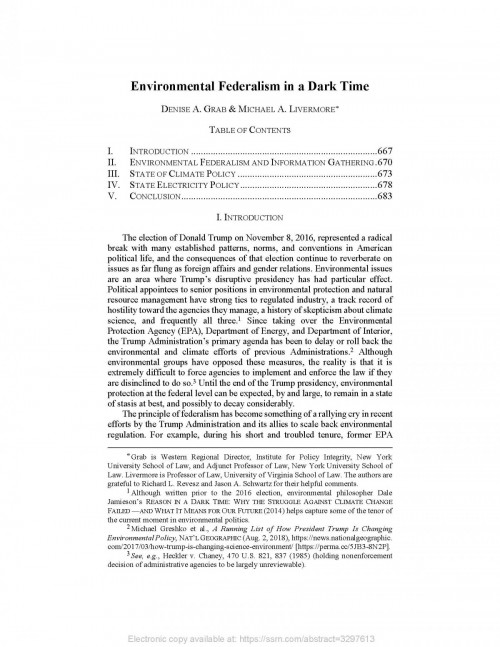
Environmental Federalism in a Dark Time
The principle of federalism has become something of a rallying cry in recent efforts by the Trump Administration and its allies to scale back environmental regulation. For example, during his short and troubled tenure, former EPA Administrator Scott Pruitt argued that the federal government has become too intrusive and that states should be returned to a position of “regulatory primacy” on environmental matters. Some states have responded to the impeding federal retreat by forging ahead. For example, California has continued to take aggressive steps to curb greenhouse gas emissions, and has even taken steps to project its influence internationally. However, despite these hopeful signs of resistance, the net effect of the Trump Administration’s efforts to scale back federal environmental policy is likely to undermine rather than energize state environmental policymaking, especially in Republican-dominated and swing states, where the climate policy vacuum is most acute.
-
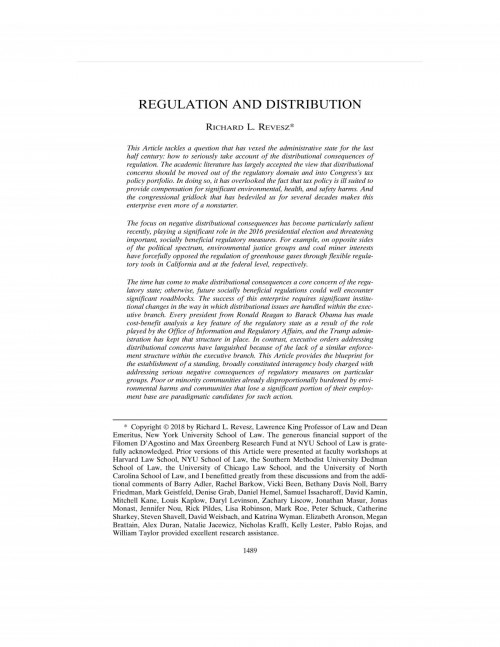
Regulation and Distribution
This article, published in the New York University Law Review, tackles a question that has vexed the administrative state for the last half century: how to seriously take account of the distributional consequences of regulation. Academic literature has largely accepted the view that distributional concerns should be moved out of the regulatory domain and into Congress’s tax policy portfolio. In doing so, it has overlooked the fact that tax policy is ill suited to provide compensation for significant environmental, health, and safety harms. And the congressional gridlock that has bedeviled us for several decades makes this enterprise even more of a nonstarter. The time has come to make distributional consequences a core concern of the regulatory state – otherwise, future socially beneficial regulations could well encounter significant roadblocks. This article provides the blueprint for the establishment of a standing, broadly constituted interagency body charged with addressing serious negative consequences of regulatory measures on particular groups.
-
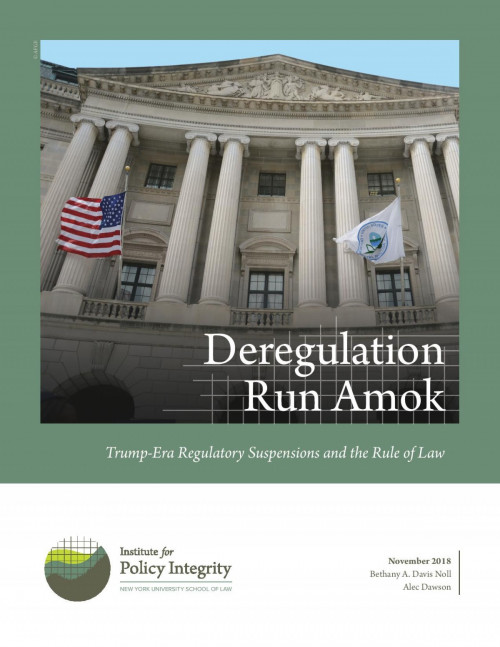
Deregulation Run Amok
Trump-Era Regulatory Suspensions and the Rule of Law
Our report provides a survey of the legality of Trump Administration’s regulatory suspensions. Looking at a number of cases, we discuss the administration’s disregard for notice-and-comment requirements, statutory restrictions, and the reasoned explanation requirement. We also lay out some of the challenges facing advocates, and the strategies by which agencies have evaded review.
Viewing recent projects in Publications

